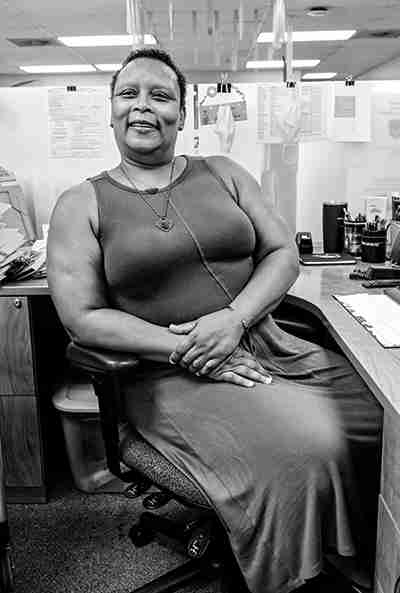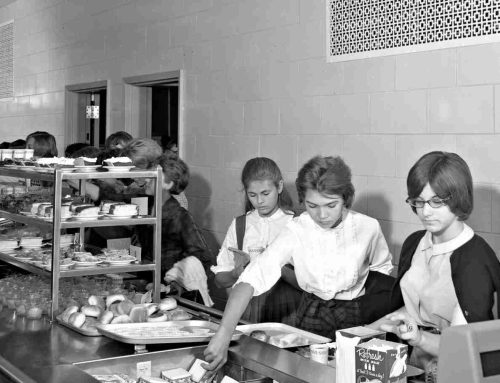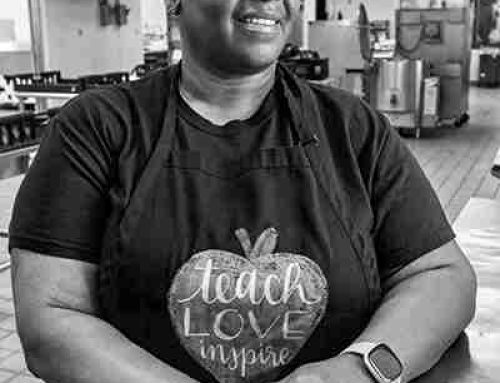Listen to the interview with Towanda and Aaron Henkin from WYPR.
Name: Towanda Carter
Job title: Regional Cafeteria Manager
Photograph location: photographed at BCPSS FNS headquarters at North Avenue
Years of service: 21
I started at Roland Park, I was the youngest one in the cafeteria…You come in thinking you’re going to serve them like you serve at home, just put it on a plate and eat it, but you have to have portion control, you have to make sure it’s presented well, and cup it well, and level it off. I learned how to be on time, dependable, follow instructions, take guidance, and listen to your elders because they’ve been there and done that. – Towanda Carter
Towanda Carter_North Avenue_09-03-21
Transcript of Towanda Carter’s interview with Aaron Henkin by Rev.com
Towanda Carter:
My name is Towanda Carter, a regional cafeteria manager for food nutrition, Baltimore City public schools. I started as a food service worker for our position. My kids’ grandmother at the time was a crossing guard, and their aunt was a full service cafeteria manager. So I was a mother with kids on social service collecting check and food stamps, so I filled out a position with the crossing guard and the food service, and the crossing guard came through first. So I started crossing the kids working four hours a day, two in the morning, two in the afternoon, and then the cafeteria position came and that was for four hours.
Towanda Carter:
So I would cross the kids in the morning, then go feed the kids, and then go cross the kids in the afternoon. And it was just the perfect job, raising kids and serving kids. It was just beautiful. And it all just worked out. And then one day, I got promoted to a six-hour position, and I was still able to do the crossing guard, and feed the kids, and cross the kids, and it was just beautiful. It just worked so harmonically, if that’s the word, but it was just beautiful to just always be there to serve them and then go home to serve my kids, so that’s where I got the joy in it.
Aaron Henkin:
How many years again, have you been at this?
Towanda Carter:
1999. Yeah.
Aaron Henkin:
Talk a little bit about the learning curve. When you get into the kitchen and you’re serving food for the first time to this many kids all at once, what did you have to learn? What surprised you about the job?
Towanda Carter:
I started at Roland Park, and the great thing about it was, I was the youngest one in the cafeteria, and I had all these [inaudible 00:01:57], beautiful women saying, “Honey, don’t pick up that whole case. Break that case down. You’re going to break your back down. Wear the right shoes, and don’t do this, and slice the meat like that.” And it was just guidance that they gave us, say like, “Put four ounces, and put eight ounces, and cut the pizza this way.” So you come in thinking you’re going to serve them like you serve at home, just put it on a plate and eat it, but you have to have portion control, and you have to make sure it’s presented well, and cup it well, and level it off. And they was just so supportive.
Towanda Carter:
And they knew I had to go home to kids. “Take this to the kids and tell the kids that we love them.” It was just such a beautiful experience. And coming in and trying to give them two scoops because this one [inaudible 00:02:37]. “No, baby, just do the portion control. Just give him what we supposed to give them. We don’t want to over…” I was like, “Yes, ma’am. Okay, you right.” “Make sure you be on time. Don’t be late because we’re counting on you.” I was like, “Yes, ma’am. You right.” So I learned how to be on time, dependable, follow instructions, take guidance, and listen to your elders because they’ve been there and done that.
Aaron Henkin:
I guess at this point in your career, you’re one of those elders who are laying down how it’s supposed to go for new people coming into the system today.
Towanda Carter:
Yes, I try. I have an employee, which is a male, and I talked to him Monday, I said, “I’m not here to hurt you,”-
Aaron Henkin:
You need to take a call?
Speaker 3:
Yes, let me-
Aaron Henkin:
That’s fine. Yeah, go ahead.
Speaker 3:
Oh, okay. Thank you so much.
Aaron Henkin:
That’s fine.
Speaker 3:
It’s a great day for nutrition, [inaudible 00:03:25], may I help you? Yes, ma’am. No, ma’am. That’s on the menu, correct? Deli sandwich and Cheez Its, so that’s all the component for the lunch menu. No separate snack [inaudible 00:03:45]. Yes, ma’am. Alrighty.
Aaron Henkin:
You were talking about this employee who’s a man.
Towanda Carter:
Yes, and he was starting to become late, coming to work late. I’m like, “Mister, you can’t report to work late. We need you.” I said, “I’m not here to bash you. I’m here to guide you, and support you, and let you know we depend on you. You have to come on time because you affect the entire operation. We need you.” “Yes, ma’am, Miss Carter. You right. I got it. Yes, ma’am. I’m like, “All right. I’m depending on you.” And I saw him this morning, I had to go before I came here, and I said, “I’m proud of you. I see you. You doing it. I’m proud of you. Thank you.” He’s like, “Yes, ma’am, Miss Carter.” So that feels good to give back. So yeah, I love my job. I do. Told you I was a crybaby.
Aaron Henkin:
That’s all right. I wonder… So 20 plus years now, you’ve been at this. It was convenient for you when you started because of your kids. I imagine they’re grown now, but you’re still… What’s kept you at this job? And what have you learned about the importance and the purpose behind what you all do?
Towanda Carter:
The importance, when you see the little kids. Thank you so… Or they come and just grab you, or you see that they’re nose is running, you grab them a tissue, or you see that their shoe’s not tied, or they don’t have socks on, and you’re like, “I have to be there to help care for this child.” And then you see them years later, “Hi, you used to feed me lunch,” or, “Hi, you used to cross me.” And it’s like, wow. And you brought up 20 years, so now it’s like I have the employees and the students that we all care for each other, and guide each other, and help each other, and it’s just a rewarding feeling. And I didn’t know I was going well up like this, and swell up, because I guess I’m realizing during this interview that I am grateful, and it’s just been such an awesome journey, and I’m grateful.
Aaron Henkin:
I wonder… You’re doing great by the way. I wonder if you might talk about, if you remember a specific story about a specific student, you obviously don’t need to use a name, but if you could just tell the story about a student you met who reminded you what was important about what you were doing, or just made you feel like you were doing a good job.
Towanda Carter:
Well, it was a classroom of students… For the teachers and the principals, they appreciate us sometimes, and it was a classroom full of students who made this poster for us, and it had all our individual names, and, “Thank you that my broccoli wasn’t soggy,” and, “Thank you that my pizza wasn’t burnt,” because that’s a pet peeve for me. Okay, so I started as the food service worker, and then I became the cafeteria manager, so I would always walk the floor like, “That broccoli mushy. Throw it away. That pizza burnt. Make some more. Do not give them nothing that you wouldn’t eat.” So to see that poster, “Thank you that our broccoli wasn’t soggy. Thank you that out pizza want burnt. Thank you for the smile today.” So when we got that poster that year, that was the best for me that year because I knew that we worked hard not to serve brown broccoli and not the serve burnt pizza. So we worked really hard for that.
Aaron Henkin:
What do you want people to know and understand about the work that you guys do? What are some of the misconceptions you think people have about food and nutrition workers, and what you do, and what you don’t do?
Towanda Carter:
That we’re not the mean lunch ladies. We’re not the mean lunch ladies. And 99.9% of us serve, prep our food with love. The 0.2% that you get, I apologize for that, but we come every morning early, trying to make sure the fruit is cut, the fruit is fresh, it’s washed, it’s prepped, the deli meat is placed nice on a tray, everything. We’re not the mean lunch ladies. Sometimes we get like, “Come on, baby. Let’s go. Grab it. Let’s go,” because we got to get the next line in, but we’re not trying to show you any meanness. We just want you to get this tray, so your next brother, sister behind you can come get their tray.
Aaron Henkin:
Talk to me about the past year and a half, the pandemic, how that changed the game for you, how that changed your job.
Towanda Carter:
For me, personally, it did not change the job for me because in our region, we had four schools, I believe, that were served as emergency meals sites. So we had 145 Alexander Hamilton, 246 Beechfield, 88 Wildwood, I can’t remember the other, but we was always there every morning, prepping bagels. It was one thing that was different that we had to bag it every day and prep it every day. So we had to do like 300 for breakfast and lunch, and then we had snack and supper. So it was continuous, continuous, more hands on deck, making sure it’s still look good, making sure the bags are full, make sure it don’t look balled up like you’re just giving them anything, still serve a quality at a high speed and a high, high quantity that we had to serve during this year and a half.
Aaron Henkin:
Couple more quick ones for you. Talk to me about… Well, this is a two-part question. What’s the most frustrating part of the job, the part of the job that gives you the biggest headache? And what’s the part of the job that is most rewarding, that makes you feel like it’s all worthwhile.
Towanda Carter:
The biggest headache for me is miscommunication. Miscommunication. Say what needs to be said, how you want it done, let’s get it done. Communicate. Say it. You can’t just think it. You have to verbally say it, so we can hear and know how you want it executed. The most rewarding part is that we’re still feeding the students. We’re still feeding them hot meals, cold meals, snack, supper. We are still feeding nutritious meals, all components. We are still serving the students.
Aaron Henkin:
Yeah, you good to go?
Speaker 4:[inaudible 00:10:17].
Aaron Henkin:
Okay. Talk about, if you would, just about the level of need that exists, in terms of food insecurity and hunger, and just how crucial it is that you all do your job consistently and well.
Towanda Carter:
Consistently and well, because you never know, thank God for the fresh fruit and vegetable program that we have. We don’t have to dip as much canned fruit, so we have fresh produce coming in. When you speak of food security, we have fresh produce for the kids. And we had a separate fruit and vegetable program where we were introducing different fruits, exotic fruits to the kids that they never saw, jackfruit, and stuff that I never even saw, so it was exciting for me as well. We all were trying it together and it was just… Plum, grapes, and it was just beautiful to experience with the kids. And I still live in inner city as well, so I have to drive to a nice fresh market and get the things that’s healthy for me as well, so to share and know that we’re in this together, we’re going to climb out of it together is a rewarding part as well.
Aaron Henkin:
Last one for you, and I’ll let you get on with your day. How do you think this job, this career path, this past 20 plus years has changed you as a person?
Towanda Carter:
It has allowed me to have more compassion, more consideration, more empathy. Compassion. That’s the word. I will have compassion.
Aaron Henkin:
Anything else you want to add that I neglected to ask you about?
Towanda Carter:
No, no. No, I feel like it’s so much more I want to say and appreciate, I just can’t articulate and say it, but my heart is saying it for me.



